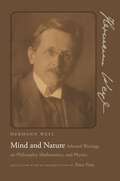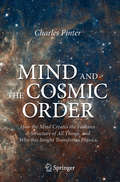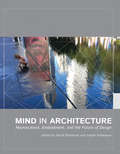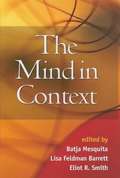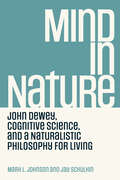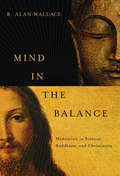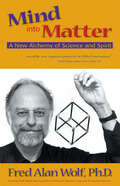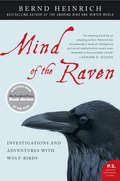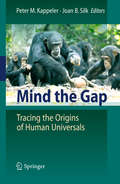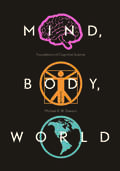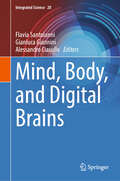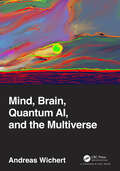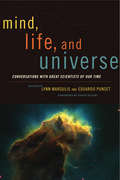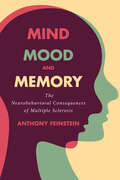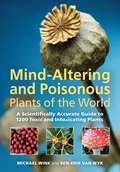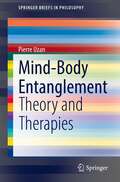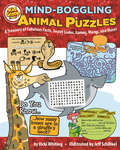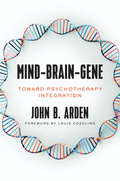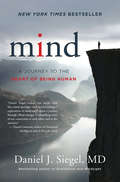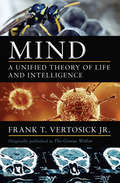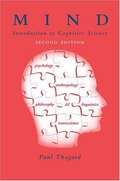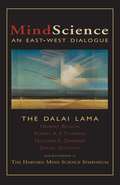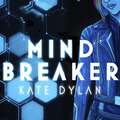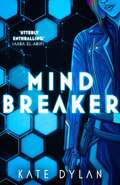- Table View
- List View
Mind and Nature: Selected Writings on Philosophy, Mathematics, and Physics
by Hermann WeylHermann Weyl (1885-1955) was one of the twentieth century's most important mathematicians, as well as a seminal figure in the development of quantum physics and general relativity. He was also an eloquent writer with a lifelong interest in the philosophical implications of the startling new scientific developments with which he was so involved. Mind and Nature is a collection of Weyl's most important general writings on philosophy, mathematics, and physics, including pieces that have never before been published in any language or translated into English, or that have long been out of print. Complete with Peter Pesic's introduction, notes, and bibliography, these writings reveal an unjustly neglected dimension of a complex and fascinating thinker. In addition, the book includes more than twenty photographs of Weyl and his family and colleagues, many of which are previously unpublished. Included here are Weyl's exposition of his important synthesis of electromagnetism and gravitation, which Einstein at first hailed as "a first-class stroke of genius"; two little-known letters by Weyl and Einstein from 1922 that give their contrasting views on the philosophical implications of modern physics; and an essay on time that contains Weyl's argument that the past is never completed and the present is not a point. Also included are two book-length series of lectures, The Open World (1932) and Mind and Nature (1934), each a masterly exposition of Weyl's views on a range of topics from modern physics and mathematics. Finally, four retrospective essays from Weyl's last decade give his final thoughts on the interrelations among mathematics, philosophy, and physics, intertwined with reflections on the course of his rich life.
Mind and the Cosmic Order: How the Mind Creates the Features & Structure of All Things, and Why this Insight Transforms Physics
by Charles PinterThe topic of this book is the relationship between mind and the physical world. From once being an esoteric question of philosophy, this subject has become a central topic in the foundations of quantum physics. The book traces this story back to Descartes, through Kant, to the beginnings of 20th Century physics, where it becomes clear that the mind-world relationship is not a speculative question but has a direct impact on the understanding of physical phenomena. The book’s argument begins with the British empiricists who raised our awareness of the fact that we have no direct contact with physical reality, but it is the mind that constructs the form and features of objects. It is shown that modern cognitive science brings this insight a step further by suggesting that shape and structure are not internal to objects, but arise in the observer. The author goes yet further by arguing that the meaningful connectedness between things — the hierarchical organization of all we perceive — is the result of the Gestalt nature of perception and thought, and exists only as a property of mind. These insights give the first glimmerings of a new way of seeing the cosmos: not as a mineral wasteland but a place inhabited by creatures.
Mind in Architecture: Neuroscience, Embodiment, and the Future of Design (Mit Press Ser.)
by Juhani Pallasmaa Sarah RobinsonLeading neuroscientists and architects explore how the built environment affects our behavior, thoughts, emotions, and well-being.Although we spend more than ninety percent of our lives inside buildings, we understand very little about how the built environment affects our behavior, thoughts, emotions, and well-being. We are biological beings whose senses and neural systems have developed over millions of years; it stands to reason that research in the life sciences, particularly neuroscience, can offer compelling insights into the ways our buildings shape our interactions with the world. This expanded understanding can help architects design buildings that support both mind and body. In Mind in Architecture, leading thinkers from architecture and other disciplines, including neuroscience, cognitive science, psychiatry, and philosophy, explore what architecture and neuroscience can learn from each other. They offer historical context, examine the implications for current architectural practice and education, and imagine a neuroscientifically informed architecture of the future.Architecture is late in discovering the richness of neuroscientific research. As scientists were finding evidence for the bodily basis of mind and meaning, architecture was caught up in convoluted cerebral games that denied emotional and bodily reality altogether. This volume maps the extraordinary opportunity that engagement with cutting-edge neuroscience offers present-day architects.ContributorsThomas D. Albright, Michael Arbib, John Paul Eberhard, Melissa Farling, Vittorio Gallese, Alessandro Gattara, Mark L. Johnson, Harry Francis Mallgrave, Iain McGilchrist, Juhani Pallasmaa, Alberto Pérez-Gómez, Sarah Robinson
Mind in Context
by Lisa Barrett Batja MesquitaMost psychology research still assumes that mental processes are internal to the person, waiting to be expressed or activated. This compelling book illustrates that a new paradigm is forming in which contextual factors are considered central to the workings of the mind. Leading experts explore how psychological processes emerge from the transactions of individuals with their physical, social, and cultural environments. The volume showcases cutting-edge research on the contextual nature of such phenomena as gene expression, brain networks, the regulation of hormones, perception, cognition, personality, knowing, learning, and emotion.
Mind in Nature: John Dewey, Cognitive Science, and a Naturalistic Philosophy for Living
by Jay Schulkin Mark L. JohnsonA dialogue between contemporary neuroscience and John Dewey&’s seminal philosophical work Experience and Nature, exploring how the bodily roots of human meaning, selfhood, and values provide wisdom for living.The intersection of cognitive science and pragmatist philosophy reveals the bodily basis of human meaning, thought, selfhood, and values. John Dewey's revolutionary account of pragmatist philosophy Experience and Nature (1925) explores humans as complex social animals, developing through ongoing engagement with their physical, interpersonal, and cultural environments. Drawing on recent research in biology and neuroscience that supports, extends, and, on occasion, reformulates some of Dewey's seminal insights, embodied cognition expert Mark L. Johnson and behavioral neuroscientist Jay Schulkin develop the most expansive intertwining of Dewey's philosophy with biology and neuroscience to date.The result is a positive, life-affirming understanding of how our evolutionary and individual development shapes who we are, what we can know, where our deepest values come from, and how we can cultivate wisdom for a meaningful and intelligent life.
Mind in the Balance: Meditation in Science, Buddhism, and Christianity (Columbia Series in Science and Religion)
by B. Alan WallaceBy establishing a dialogue in which the meditative practices of Buddhism and Christianity speak to the theories of modern philosophy and science, B. Alan Wallace reveals the theoretical similarities underlying these disparate disciplines and their unified approach to making sense of the objective world. Wallace begins by exploring the relationship between Christian and Buddhist meditative practices. He outlines a sequence of meditations the reader can undertake, showing that, though Buddhism and Christianity differ in their belief systems, their methods of cognitive inquiry provide similar insight into the nature and origins of consciousness. From this convergence Wallace then connects the approaches of contemporary cognitive science, quantum mechanics, and the philosophy of the mind. He links Buddhist and Christian views to the provocative philosophical theories of Hilary Putnam, Charles Taylor, and Bas van Fraassen, and he seamlessly incorporates the work of such physicists as Anton Zeilinger, John Wheeler, and Stephen Hawking. Combining a concrete analysis of conceptions of consciousness with a guide to cultivating mindfulness and profound contemplative practice, Wallace takes the scientific and intellectual mapping of the mind in exciting new directions.
Mind into Matter: A New Alchemy of Science and Spirit
by Fred Alan WolfA physicist examines ideas from medieval alchemy and contemporary science to explore the connection between mind and matter.Alchemists of old attempted to make sense of the universe—to discover the connection between mind and matter. Some of today’s scientists, in particular quantum physicists, are doing the same. In this contribution to the study of consciousness, physicist Fred Alan Wolf reveals what he calls the “new alchemy” —a melding of the ideas of the old alchemists and the new scientists to reach a fuller understanding of mind and matter.An elegant book with short, stand-alone chapters, each framed by an alchemical symbol and its definition, Mind into Matter is thought provoking for scientists and lay people alike.Praise for Mind into Matter“I consider Fred Alan Wolf one of the most important pioneers in the field of consciousness. This book could change the way you perceive the world.” —Deepak Chopra, MD, FACP, author of How to Know God“Once again, physicist Fred Alan Wolf takes us on a magical mystery tour into the adventure land of science and spirit. . . . Both enthralling and energizing.” —Michael Toms, cofounder, host, producer of New Dimensions Radio“How refreshing to have a scientist put the emphasis on the individual where it belongs! Wolf has written a glorious entertainment for the mind that matters.” —Kenneth Ring, PhD, author of Lessons from the Light“[A]llows readers to look at their own inner mechanism and better understand the consciousness which gives them life and makes them aware of the outer world of forms and phenomena in which they live.” —Glen P. Kezwer, Ph.D., physicist, author of Meditation, Oneness and Physics
Mind of the Raven: Investigations and Adventures with Wolf-Birds (P. S. Series)
by Bernd HeinrichHeinrich involves us in his quest to get inside the mind of the raven. But as animals can only be spied on by getting quite close, Heinrich adopts ravens, thereby becoming a "raven father," as well as observing them in their natural habitat. He studies their daily routines, and in the process, paints a vivid picture of the ravens' world. At the heart of this book are Heinrich's love and respect for these complex and engaging creatures, and through his keen observation and analysis, we become their intimates too.Heinrich's passion for ravens has led him around the world in his research. Mind of the Raven follows an exotic journey--from New England to Germany, and from Montana to Baffin Island in the high Arctic--offering dazzling accounts of how science works in the field, filtered through the eyes of a passionate observer of nature. Each new discovery and insight into raven behavior is thrilling to read, at once lyrical and scientific.
Mind the Gap
by Joan Silk Peter KappelerWhat makes us human? What made us become the way we are? One way to answer these questions is to identify the traits that all humans share, traits that are universal features of all human societies. Another way to do so is to ask how humans differ from other species, particularly from our closest relatives, the nonhuman primates. The contributors to this book pursue both approaches, in an effort to understand how evolution has shaped modern human behavior and societies.
Mind, Body, World: Foundations of Cognitive Science
by Michael R. DawsonCognitive science arose in the 1950s when it became apparent that a number of disciplines, including psychology, computer science, linguistics, and philosophy, were fragmenting. Perhaps owing to the field’s immediate origins in cybernetics, as well as to the foundational assumption that cognition is information processing, cognitive science initially seemed more unified than psychology. However, as a result of differing interpretations of the foundational assumption and dramatically divergent views of the meaning of the term information processing, three separate schools emerged: classical cognitive science, connectionist cognitive science, and embodied cognitive science. Examples, cases, and research findings taken from the wide range of phenomena studied by cognitive scientists effectively explain and explore the relationship among the three perspectives. Intended to introduce both graduate and senior undergraduate students to the foundations of cognitive science, Mind, Body, World addresses a number of questions currently being asked by those practicing in the field: What are the core assumptions of the three different schools? What are the relationships between these different sets of core assumptions? Is there only one cognitive science, or are there many different cognitive sciences? Giving the schools equal treatment and displaying a broad and deep understanding of the field, Dawson highlights the fundamental tensions and lines of fragmentation that exist among the schools and provides a refreshing and unifying framework for students of cognitive science.
Mind, Body, and Digital Brains (Integrated Science #20)
by Flavia Santoianni Alessandro Ciasullo Gianluca GianniniThis book—Mind, Body, and Digital Brains—focuses on both theoretical and empirical issues and joins contributions from different disciplines, concepts, and sensibilities, bringing together scholars from fields that at first glance may appear different—Neuroscience and Cognitive Neuroscience; Robotics, Computer Science, Deep Learning, and Information Processing Systems; Education, Philosophy, Law, and Psychology. All these research fields are held together by the very object to be discussed: a broad, articulate, and polyphonic reflection on the status of theories and fields of application of Digital Technologies and Artificial Intelligence, seen from the perspective of the digital mind, digital body, and digital brain. Scientific and humanistic issues will be considered through an interdisciplinary point of view, with the purpose of deepening emerging trends about various disciplines. This book offers a framework for different perspectives and, at the same time, a platform for discussion aimed not only at experts, but also at a non-specialist public interested in the digital revolution. The digital revolution is emerging from the intertwining of ethical, philosophical, and technological aspects, which concern several general issues as cooperation, law, and environment, but also specialized as cybersecurity or algorithmic citizenship. More questions arise, concerning which opportunities and risks are associated with the new scenarios, what idea of humanity is emerging from the increasingly widespread use of Artificial Intelligence technologies, and what idea of integrated science should we promote to accompany the ongoing transformations.
Mind, Brain, Quantum AI, and the Multiverse
by Andreas WichertMind, Brain, Quantum AI, and the Multiverse There is a long-lasting controversy concerning our mind and consciousness.This book proposes a connection between the mind, the brain, and the multiverse. The author introduces the main philosophical ideas concerning mind and freedom, and explains the basic principles of computer science, artificial intelligence of brain research, quantum physics, and quantum artificial intelligence. He indicates how we can provide an answer to the problem of the mind and consciousness by describing the nature of the physical world. His proposed explanation includes the Everett Many-Worlds theory. Mind, Brain, Quantum AI, and the Multiverse tries to avoid any non-essential metaphysical speculations. The book is an essential compilation of knowledge in philosophy, computer science, biology, and quantum physics. It is written for readers without any requirements in mathematics, physics, or computer science.
Mind, Life, and Universe
by Lynn Margulis Eduardo PunsetNearly 40 of the world's most esteemed scientists discuss the big questions that drive their illustrious careers. Frank and often irreverent, the men and women assembled here reveal a hidden world of intellectual interests, verve, and humor.
Mind, Mood, and Memory: The Neurobehavioral Consequences of Multiple Sclerosis
by Anthony FeinsteinA unique resource for all health care practitioners caring for people with multiple sclerosis.Endorsed by The Consortium of Multiple Sclerosis CentersMultiple sclerosis (MS), a progressive neurologic disease, is characterized by a host of physical symptoms. But the neurobehavioral consequences of MS can be as devastating and debilitating as physical symptoms, and they are often unreported and undertreated. In this new book, Dr. Anthony Feinstein, a neuropsychiatrist, documents the effects of MS on cognition, information processing speed, learning and memory, executive function, personality, mood, and behavior.Feinstein touches on a number of topics, including• the common cognitive challenges that occur with MS, such as slowed information processing speed, impaired memory, and executive function deficits • psychiatric disorders that accompany MS, such as depression and psychosis• current neuropsychological, brain MRI, and treatment data applicable to the psychiatric and cognitive disordersMind, Mood, and Memory in Multiple Sclerosis is enhanced both by the latest science and by eloquent case histories that illustrate each cognitive and emotional disorder. Feinstein also provides recommendations for evidence-based therapeutic interventions. Written in an immediate, accessible way, this book has a crossover appeal, making it of interest not only to neurologists, psychiatrists, neuropsychiatrists, neuropsychologists, psychologists, occupational therapists, and nurses but also to people with MS and their caregivers, family, and friends.
Mind-Altering and Poisonous Plants of the World
by Michael Wink Ben-Erik van WykThe book is meant for gardeners, pharmacists, doctors or members of Poison Centres to identify and learn about more than 1200 poisonous and mind-altering plants and to be able to help in case of poisoning and intoxication.
Mind-Body Entanglement: Theory and Therapies (SpringerBriefs in Philosophy)
by Pierre UzanThis book suggests a radical departure in approaching the mind-body problem. Instead of trying to causally relate subjective experience to the functioning of the body, it begins with the notion of the psychosomatic unity of the individual and looks for its conditions of possibility. This text shows that what makes this unity possible is the generalized entanglement relation that connects a person's subjective experience with its body functioning in a specific way.In addition to providing a significant contribution to the long-standing philosophical debate about the nature of the mind-body connection, this change of perspective based on the concept of generalized entanglement allows for exploring a holistic approach to health. It can for example explain the existence of body memory and leads to a better understanding of the genesis and evolution of internal diseases, allowing for the development of mind-body therapies. This volume also provides new insights into mental disorders and sets the theoretical basis of self-healing methods appealing to students, researchers and professionals in the fields.
Mind-Boggling Animal Puzzles: A Treasury of Fabulous Facts, Secret Codes, Games, Mazes, and More! (Kid Scoop)
by Vicki WhitingA brain-busting activity book that lets kids learn about animals from kangaroos and polar bears to tarantulas and snakes—all while having loads of fun! With crazy cool codes, puzzles, word searches, and so much more, these entertaining activities align with STEM curricula to keep kids engaged as they learn. Author and former teacher Vicki Whiting is the founder of Kid Scoop, an award-winning weekly activity page that promotes standards-based learning. Parents and teachers around the world use Vicki&’s fun activities to stimulate academic success and a joy of learning. With this expansive collection of exercises, kids aged 5-10 will spend hours learning loads of fun facts all about animals as they complete hundreds of exciting activities. This is a fixed-format ebook, which preserves the design and layout of the original print book
Mind-Brain-Gene: Toward Psychotherapy Integration
by John ArdenAn exploration of the ways the immune system, epigenetics, affect regulation, and attachment intersect in mental health. The evolution of psychotherapy in the 21st Century demands integration. Instead of choosing from the blizzard of modalities and schools of the past, therapists must move toward finding common denominators among them. Similarly, today’s psychotherapy necessitates the integration of the mind and body, not the past practice of compartmentalization of mental health and physical health. This book contributes to the sea change in how we conceptualize mental health problems and their solutions. Mind-Brain-Gene describes the feedback loops between the multiple systems contributing to the emergence of the mind and the experience of the self. It explains how our mental operating networks “self”-organize, drawing from and modifying our memory systems to establish and maintain mental health. Synthesizing research in psychoneuroimmunology and epigenetics with interpersonal neurobiology and research on integrated psychotherapeutic approaches, John Arden explores how insecure attachment, deprivation, child abuse, and trauma contribute to anxiety disorders and depression to produce epigenetic affects. To help people suffering from anxiety and depression, it is necessary to make sense of the multidirectional feedback loops between the stress systems and the dysregulation of the immune system that lead to those conditions. Successful psychotherapy modifies the feedback loops among the self-maintenance systems. Through the orchestration of the mental operating networks, psychotherapy promotes the re-regulation of immune system functions, stress systems, nutrition, microbiome (gut bacteria), sleep, physical inactivity, affect regulation, and cognition. This book makes a strong case for healthcare and psychotherapy to be combined—together they can revolutionize the way we conceive of, and attain, optimal health in the 21st Century.
Mind: A Journey to the Heart of Being Human
by Daniel J. SiegelA scientist's exploration into the mysteries of the human mind. What is the mind? What is the experience of the self truly made of? How does the mind differ from the brain? Though the mind's contents--its emotions, thoughts, and memories--are often described, the essence of mind is rarely, if ever, defined. In this book, noted neuropsychiatrist and New York Times best-selling author Daniel J. Siegel, MD, uses his characteristic sensitivity and interdisciplinary background to offer a definition of the mind that illuminates the how, what, when, where, and even why of who we are, of what the mind is, and what the mind's self has the potential to become. MIND takes the reader on a deep personal and scientific journey into consciousness, subjective experience, and information processing, uncovering the mind's self-organizational properties that emerge from both the body and the relationships we have with one another, and with the world around us. While making a wide range of sciences accessible and exciting--from neurobiology to quantum physics, anthropology to psychology--this book offers an experience that addresses some of our most pressing personal and global questions about identity, connection, and the cultivation of well-being in our lives.
Mind: A Unified Theory of Life and Intelligence
by Frank T. Vertosick Jr.In this &“engaging&” book, a noted neurosurgeon explores the possibility of intelligence in bacteria and other microorganisms (Library Journal). It has a goal and a strategy to achieve it. It disguises itself as it stealthily surveys its enemy&’s vulnerabilities. It mobilizes its resources to conquer. It bides its time until it is certain it can overwhelm its victim. Then it attacks. If it detects resistance it changes tactics–retreats, sends for reinforcements, captures its enemy&’s intelligence and incorporates it. It regroups and, transformed, goes forth again to triumph. This could be a description of a human army. It happens, however, to be a description of an army of cancer cells. Most of us shrink from describing bacteria and other microorganisms as intelligent. Neurosurgeon Frank Vertosick does not. And perhaps, when you finish reading MIND: A UNIFIED THEORY OF LIFE AND INTELLIGENCE, you will not either. What is intelligence? We define it in human terms, but are humans the only measure? We ascribe it to higher mammals and to social insects like bees and ants, but when we cross the threshold into cellular life, definitions blur. This revolutionary–but accessible and highly entertaining–exploration of intelligence is guaranteed to alter your appreciation of life on its most fundamental level. Frank T. Vertosick, J.R., M.D. is the author of WHEN AIR HITS YOUR BRAIN and WHY WE HURT: THE NATURAL HISTORY OF PAIN (Originally published as THE GENIUS WITHIN)
Mind: A Unified Theory of Life and Intelligence
by Frank T. Vertosick Jr.In this &“engaging&” book, a noted neurosurgeon explores the possibility of intelligence in bacteria and other microorganisms (Library Journal). It has a goal and a strategy to achieve it. It disguises itself as it stealthily surveys its enemy&’s vulnerabilities. It mobilizes its resources to conquer. It bides its time until it is certain it can overwhelm its victim. Then it attacks. If it detects resistance it changes tactics–retreats, sends for reinforcements, captures its enemy&’s intelligence and incorporates it. It regroups and, transformed, goes forth again to triumph. This could be a description of a human army. It happens, however, to be a description of an army of cancer cells. Most of us shrink from describing bacteria and other microorganisms as intelligent. Neurosurgeon Frank Vertosick does not. And perhaps, when you finish reading MIND: A UNIFIED THEORY OF LIFE AND INTELLIGENCE, you will not either. What is intelligence? We define it in human terms, but are humans the only measure? We ascribe it to higher mammals and to social insects like bees and ants, but when we cross the threshold into cellular life, definitions blur. This revolutionary–but accessible and highly entertaining–exploration of intelligence is guaranteed to alter your appreciation of life on its most fundamental level. Frank T. Vertosick, J.R., M.D. is the author of WHEN AIR HITS YOUR BRAIN and WHY WE HURT: THE NATURAL HISTORY OF PAIN (Originally published as THE GENIUS WITHIN)
Mind: Introduction to Cognitive Science (2nd edition)
by Paul ThagardCognitive science approaches the study of mind and intelligence from an interdisciplinary perspective, working at the intersection of philosophy, psychology, artificial intelligence, neuroscience, linguistics, and anthropology. With Mind, Paul Thagard offers an introduction to this interdisciplinary field for readers who come to the subject with very different backgrounds. It is suitable for classroom use by students with interests ranging from computer science and engineering to psychology and philosophy. Thagard's systematic descriptions and evaluations of the main theories of mental representation advanced by cognitive scientists allow students to see that there are many complementary approaches to the investigation of mind. The fundamental theoretical perspectives he describes include logic, rules, concepts, analogies, images, and connections (artificial neural networks). The discussion of these theories provides an integrated view of the different achievements of the various fields of cognitive science. This second edition includes substantial revision and new material. Part I, which presents the different theoretical approaches, has been updated in light of recent work the field. Part II, which treats extensions to cognitive science, has been thoroughly revised, with new chapters added on brains, emotions, and consciousness. Other additions include a list of relevant Web sites at the end of each chapter and a glossary at the end of the book. As in the first edition, each chapter concludes with a summary and suggestions for further reading.
MindScience
by Daniel Goleman Herbert Benson Robert Thurman His Holiness the Dalai Lama Howard GardnerWhat is the subtle relationship between mind and body? What can today's scientists learn about this relationship from masters of Buddhist thought? Is it possible that by combining Western and Eastern approaches, we can reach a new understanding of the nature of the mind, the human potential for growth, the possibilities for mental and physical health? MindScience explores these and other questions as it documents the beginning of a historic dialogue between modern science and Buddhism. The Harvard Mind Science Symposium brought together the Dalai Lama and authorities from the fields of psychiatry, psychology, neuroscience, and education. Here, they examine myriad questions concerning the nature of the mind and its relationship to the body.
Mindbreaker
by Kate DylanSet in the same world as the extraordinary Mindwalker, Mindbreaker is an action packed young adult science fiction novel asking: what would you sacrifice to survive?They saved her life. But at what cost?Born into a religious, anti-tech cult, seventeen-year-old Indra lives a simple, mod-free existence on the fringe of society. But when an illicit trip to the city leaves her with a debilitating - and terminal - condition, Indra must make a choice: die faithful, or betray her Order and accept the cure Glindell Technologies is offering. Forced to sign over full ownership of her life, Indra is horrified to learn how Glindell chose to save her mind and body. On the outside, she still looks the same. On the inside, Indra's not so sure. She's missing time, for one thing, and more than once, she finds herself in places she really shouldn't be, with no memory of how she got there and abilities she can't explain.So when news breaks of a vicious attack against Glindell's biggest rival, Indra begins to suspect the worst about her new master. With help from her one friend at the company, Tian - a research assistant with a genius IQ and a smile that won't quit - Indra manages to escape the lab. Then together with the anti-corp faction she and Tian turn to for help, Indra must uncover the truth behind the procedure that saved her life, before Glindell can use it to change the face of technology - and what it means to be human - forever.(P) 2023 Hodder & Stoughton Limited
Mindbreaker
by Kate DylanNo more quiet rebellions.'A dystopian thriller that fizzes with energy and rebellion' SAMANTHA SHANNONAn explosive cyberpunk SF thriller from the author of Mindwalker, set in a world of corporate intrigue and dangerous technology. Born into a religious cult on the fringe of society, Indra Dyer lives a simple, tech-free existence. But when an illicit trip to the city leaves her with a debilitating - and terminal - condition, Indra must make a choice: die faithful or betray her Order and accept the cure Glindell Technologies is offering. Forced to sign over full ownership of her life, Indra is horrified to learn the true nature of Glindell's plans. Instead of saving her body, they upload her mind to a first-of-its-kind MindDrive, housed in a fully robotic shell. On the outside, Indra still looks the same; on the inside, she's not so sure. She keeps finding herself in places she really shouldn't be, with no memory of how she got there, and dangerous abilities she can't explain. So when news breaks of an attack against Glindell's biggest rival, Indra suspects the worst. With the help of Tian - a research assistant with questionable morals and a smile that won't quit - Indra must uncover the truth behind the procedure that saved her life, before Glindell can use it to change the face of technology, and what it means to be human, forever . . .PRAISE FOR KATE DYLAN'Witty, gritty, and vicious fun' HANNAH KANER'An invigorating ride at breakneck speed . . . Electric' SAARA EL-ARIFI'The thrill ride of a lifetime' KAT DUNN'Pure adrenaline shot straight into your veins' JESSE Q. SUTANTO'Sharp-edged, tense and thrilling, you'll be holding your breath until the last page' TASHA SURI
